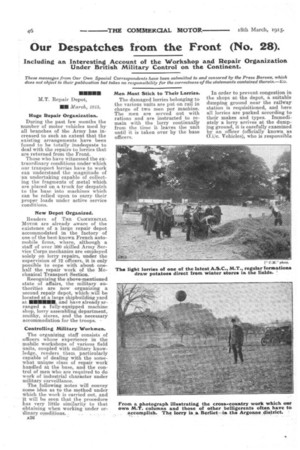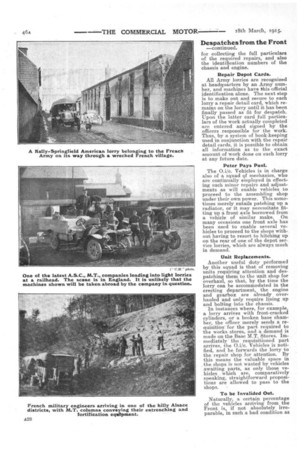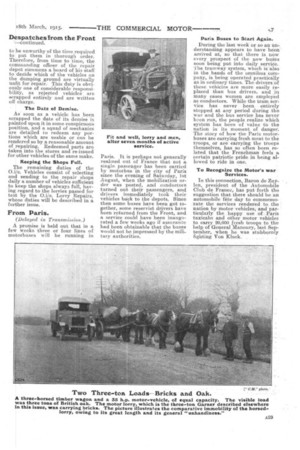Our Despatches from the Front (No. 28).
Page 6

Page 8

Page 9

If you've noticed an error in this article please click here to report it so we can fix it.
Including an Interesting Account of the Workshop and Repair Organization Under British Military Control on the Continent.
These messages from Our Own Special Correspondents have been subtniited to and censored by the Press Bureau, which does not object to their publication but takes no responsibility for the correctness of the statements contained therein.—ED.
Huge Repair Organization.
During the past few months the number of motor vehicles used by all branches of the Army has increased to such an extent that the existing arrangements have been found to he totally inadequate to deal with the repairs to lorries that are returned from the Front.
Those who have witnessed the extraordinary conditions under which our transport lorries have to work can understand the magnitude of an undertaking capable of collecting the fragments of metal which are placed on a truck for despatch to the base into machines which can be relied upon to carry their proper loads under active service conditions.
New Depot Organized.
Readers of Tan COMMERCIAL MOTOR are already aware of the existence of a large repair depot accommodated in the factory of one of the best-known French automobile firms, where, although a staff of over 300 skilled Army Service Corps mechanics are employed solely on lorry repairs, under the supervision of 12 officers, it is only possible to cope with about onehalf the repair work of the Mechanical Transport Section.
Recognizing the above-mentioned state of affairs, the military authorities are now organizing a second repair depot, which-will be located at a large shipbuilding yard at MEM. and have already arranged a fully-equipped machine shop, lorry assembling department, smithy, stores, and the necessary accommodation for the troops.
Controlling Military Workmen.
The organizing staff consists of officers whose experience in the mobile workshops of various field units, coupled with military knowledge, renders them particularly capable of dealing with the somewhat unique class of repair work handled at the base, and the control of men who are required to do work of industrial character under military surveillance.
The following notes will convey some idea as to the method under Which the work is carried out, and it will be seen that the procedure lias very little similarity to that obtaining when working under or dinary conditions. A26 Men Must Stick to Their Lorries.
The damaged lorries belonging to the various units are put on rail in charge of two men per machine. The men are served out with rations and are instructed to remain with the lorry continually from the time it leaves the unit until it is taken over by the base officers. In order to prevent congestion in the shops at the depot, a suitable dumping ground near the railway station is requisitioned, and he-re all lorries are parked according to their makes and types. Immediately a lorry arrives at the dumping ground, it is carefully examined by an officer (officially known as 0.f/c. Vehicles), who is responsible for collecting the full particulars of the required repairs, and also the identification numbers of the chassis and engine.
Repair Depot Cards.
All Army lorries are recognized at headquarters by an Army number, and machines have this official identification alone. The next step is to make out and secure to each lorry a repair detail card, which remains on the lorry until t has been finally passed as fit for despatch. Upon the latter card full particulars of the work actually completed are entered and signed by the officers responsible for• the work. Thus, by a system of book-keeping used in conjunction with the repair detail cards, it is possible to obtain all information as to the exact amount of work done on each lorry at any future date.
Peter Pays Paul.
The 0.i/c. Vehicles is in charge also of a squad of mechanics, who are continually employed in effecting such minor repairs and adjustments as will enable vehicles to proceed to the assembling shop under their own power. This sometimes merely entails patching up a radiator, or it may necessitate fitting up a front axle borrowed from a vehicle of similar make. On many occasions one front axle has been used to enable several vehicles to proceed to the shops without having to resort to hitching up on the rear of one of the depot service lorries, which are always much in demand.
Unit Replacements.
Another useful duty performed by this squad is that of removing units requiring attention and despatching them to the unit shop for overhaul, so that, by the time the lorry can be accommodated in the erecting department, the engine and gearbox are already overhauled and only require lining up and bolting into the chassis.
In instances where, for example, a lorry arrives with frost-cracked cylinders, or a broken base chamber, the officer merely sends a requisition for the part required to the works stores, and a demand is made on the Base M.T. Stores. Immediately the requisitioned part arrives, the 0.1/c. Vehicles is notified, and he forwards the lorry to the repair shop, for attention. By this means the valuable space in the shops is not wasted by vehicles awaiting parts, as only those vehicles which are, comparatively sneaking, straightforward propositions are allowed to pass to the shops.
To be Invalided Out.
Naturally, a certain percentage of the vehicles arriving from the Front is, if not absolutely irreparable, in such a bad condition as
to be unworthy of the time required to put them in thorough order. Therefore, from time to time, the commanding officer of the repair depot summons a board of his staff to decide which of the vehicles on the dumping ground are virtually unfit for repair. This duty is obviously one of considerable responsibility, as rejected vehicles are scrapped entirely and are written off charge.
• The Date of Demise.
As soon as a vehicle has been scrapped the date of its demise is painted upon it in some conspicuous position, and a squad of mechanics are detailed to redeem any portions which are usable or cart be rendered so by a reasonable amount of repairing. Redeemed parts are taken into the stores and re-issued for other vehicles of the same make.
Keeping the Shops Full.
The remaining duties of the 0.1/c. Vehicles consist of selecting and sending to the repair shops daily a number of vehicles sufficient to keep the shops always full, having regard to the lorries passed for test by the 0.i/c. Lorry Repairs, whose duties will be described in a further issue.
From Paris.
(Delayed in, Trammission.) A promise is held out that in a few weeks three or four lines of motorbuses will be running in Paris. It is perhaps not generally realized out of France that not a single passenger has been carried by motorbus in the city of Paris since the evening of Saturday, 1st August, when the mobilization order was posted, and conductors turned out their passengers, and drivers immediately took their vehicles back to the depots. Since then some buses have been got together, some reservist drivers have been returned from the Front, and a service could have been inaugurated a few weeks ago if assurance had been obtainable that the buses would not be impressed by the military authorities.
During the last week or so an understanding appears to have been arrived at, so that there is now every prospect of the new buses soon being put into daily service. The tramway system, which is also in the hands of the omnibus company, is being operated practically as in ordinary times. The drivers of these vehicles are more easily re-. placed than bus drivers, and .in many cases women are employed as conductors. While the tram ser:. vice has never been entirely stopped at any period during the war and the bus service has never bc.en run, the people realize which system has been of value to the nation in its moment of danger. The story of how the Paris motorbuses are carrying fresh meat to the troops, or are carrying the troops themselves, has so often been related that the Frenchman feels a certain patriotic pride in being allowed to ride in one.
To Recognize the Motor's war Services.
In this connection, Baron de Zuylen, president of the Automobile Club de France, has put forth the suggestion that there should be an automobile fête day to commemorate the services rendered to the nation by motor vehicles, and particularly the happy use of Paris taxicabs and other motor vehicles to carry 20,000 fresh troops to the help of General Manoury, last September, when he was stubbornly fighting Von Kluck.






















